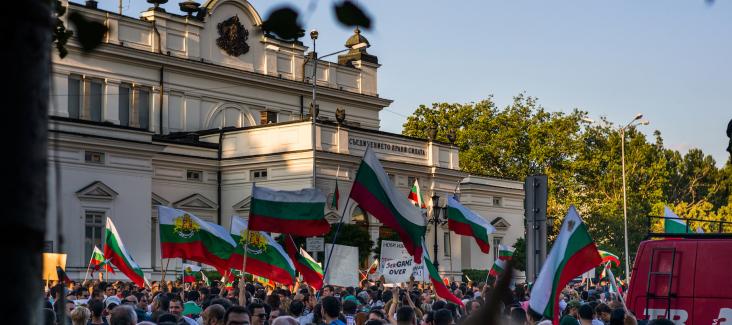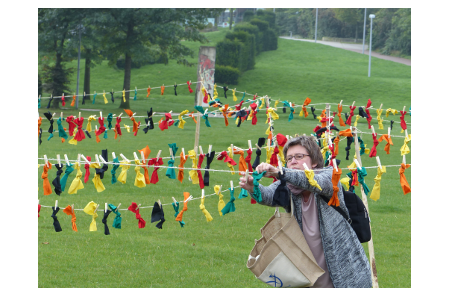From summer 2020 to spring 2021, Bulgaria experienced a series of protests not only in its capital city Sofia, but also in cities abroad which have a major Bulgarian community, such as Brussels and London. The protests were directed against the bulgarian prime minister, Boyko Borissov, who has dominated the country’s politics for more than a decade.Citizens link his governance under the GERB party to the increase of political corruption. The recent protests were a vivid representation of how frustrated Bulgarians are with the presence of corruption and lack of transparency in public institutions. However, Borissov refused to resign, following the protests, by publicly declaring that they were staged and that there was no adequate alternative to his governance. When finally the 4-year term of Borissov’s cabinet ended, parliamentary elections were held in Bulgaria on April 4, 2021. Unfortunately, snap parliamentary elections had to be held in July, 2021 because no party could form a government or was willing to do so. The second elections failed as well to provide Bulgaria with a new government.
On November 14, 2021 Bulgaria held its third parliamentary elections in just one year and in relation to that we spoke with Daniela Bozhinova, who currently serves as a town councilor in Burgas, Bulgaria. As a political scientist and social entrepreneur who works for the advancement of democracy and democratic governance both locally and internationally, she has strong doubts on a realistic picture of how well democracy is being developed in Bulgaria and what are expectations for the future.
Prior to the third parliamentary elections, a major hope emerged in the face of the newly formed anti-corruption party, We Continue the Change (PP), led by Harvard graduates Kiril Petkov and Asen Vassilev. The party surprisingly came first at the elections, winning 67 out of the 240 open seats in the National Assembly. Many opponents of Borissov believe that PP will completely change politics in Bulgaria; develop the country, both economically and socially, and completely end corruption that is spread out. Ms. Bozhinova shared that personally she is both “hopeful and skeptical at the same time” regarding the party. This is not because she wants to definitely find some vulnerability, but because up to now,Bulgarians have experienced a series of “messiahs” or "supermen," so to speak, who promised them salvation but then disappointed them. Thus, she is taking new promises for a change “with a grain of salt”. She really hopes that PP takes the needed actions for the recovery of the Bulgarian economy, which was negatively affected by the COVID-19 pandemic. It has to be pointed out that the party has not made many promises with regard to democratic reforms. Ms. Bozhinova really hopes that when they form a coalition this will be taken into account. She is hopeful that democratic reforms will be introduced, because ideas regarding the stabilisation and development of democracy in Bulgaria have been popularised by other eventual participants in PP’s coalition. For example, “a very effective reform will be the judicial reform and properly investigating some people who are to be blamed for pocketing public money and subsequently, taking them to court.” Bulgarians have not seen that in 30 years, even though they have heard a lot of promises.
Ms. Bozhinova also emphasised on the importance of direct democracy as a tool for fighting corruption and boosting transparency. She has worked extensively to develop direct democracy in Bulgaria, as evidenced for example by her recent initiative in Burgas.The district mayors in Burgas are elected by the mayor of the municipality. It makes much more sense for them to be elected directly by the people, because then the district mayors will not simply be bureaucrats, but will be individuals with personal responsibility to the people who have expressed their trust by voting. Unfortunately, the municipality mayor is not desiring for the people to have the power of direct democracy and this proposal was rejected.
Not only in Burgas, but throughout Bulgaria, the instruments of direct democracy are not sufficiently developed, and are restricted by law. In 30 years Bulgarians have not had any decision made directly by citizens. Ms. Bozhinova expressed that “this is not because citizens have not been active, but because of the bad laws related to the expression of citizens’ will”. A technical problem with referendums is seen in the face of the participation quorum. Reducing the required quorum for validity is extremely necessary because the current threshold in the law is “not less than those who voted in the last parliamentary elections”. The quorum required today makes any referendum doomed to failureThis discourages active citizens from initiating referendums and allows the representative government to commit atrocities against the people, knowing that citizens do not have an effective means of controlling it. The requirement for holding referendums in Bulgaria is signature to the country and is a “legal absurdity that no other country has”.
The important question is then, why when the blockages to direct democracy in Bulgaria are so obvious, things have not changed? Ms. Bozhinova said that “because the ones who make the rules, are the ones who do not want to redistribute power. Instruments for direct democracy are related to giving some of your power, originally given by the people, back to them. The elected rulers say to the people that they are not competent enough to make decisions. They are telling people that they can just play the referendum game by asking questions and collecting signatures”. In this relation she is thinking of writing an article about “referenduming”- a term she considers has been coined by her. Bulgarians do not have referendums, they have referenduming- “referendums that serve any other purpose but not their original purpose of giving people the opportunity to make direct decisions. They serve the power of political marketing, party building and consolidation, image making, but not making direct decisions. This is the kind of manipulation that politicians use to make people believe that they have some power, when in reality they do not”.
There is an urgent need for change in this direction because direct democracy has not only the power to reduce corruption and bring transparency, but also to increase trust in the political system. Ms. Bozhinova has studied many empirical researches, especially in countries that include citizen’s initiatives and referendums, such as Switzerland and the US. She reported that “the trust in institutions is much higher in cantons, states and towns that have a well-developed initiative and referendum system compared to others that have it but it is not well-developed”. As people participate in taking decisions on topics that directly affect them, such as taxation, they are much more likely to agree with established rules followed by their direct decision-making, for example, by being reliable tax payers.
Generally, politicians in power do not want to give away power. This is why only parties in the opposition are supportive of direct democracy. Once they get into power, they change their minds. As Ms. Bozhinova said: “Political parties like referendums as much as turkeys like Christmas”. This observation in addition to the politically unstable situation in Bulgaria signal that it will not be easy to renew democracy and, in particular, to improve the rudimentarily developed direct democracy. But precisely because it will not be easy to upgrade democracy in Bulgaria, citizens must exert pressure to improve the instruments of direct democracy and ensure that the promises of the new figures in the political landscape do not remain only that.
"Protests in Sofia, Bulgaria - 16.06.2013" by Georgi C is licensed under CC BY 2.0


